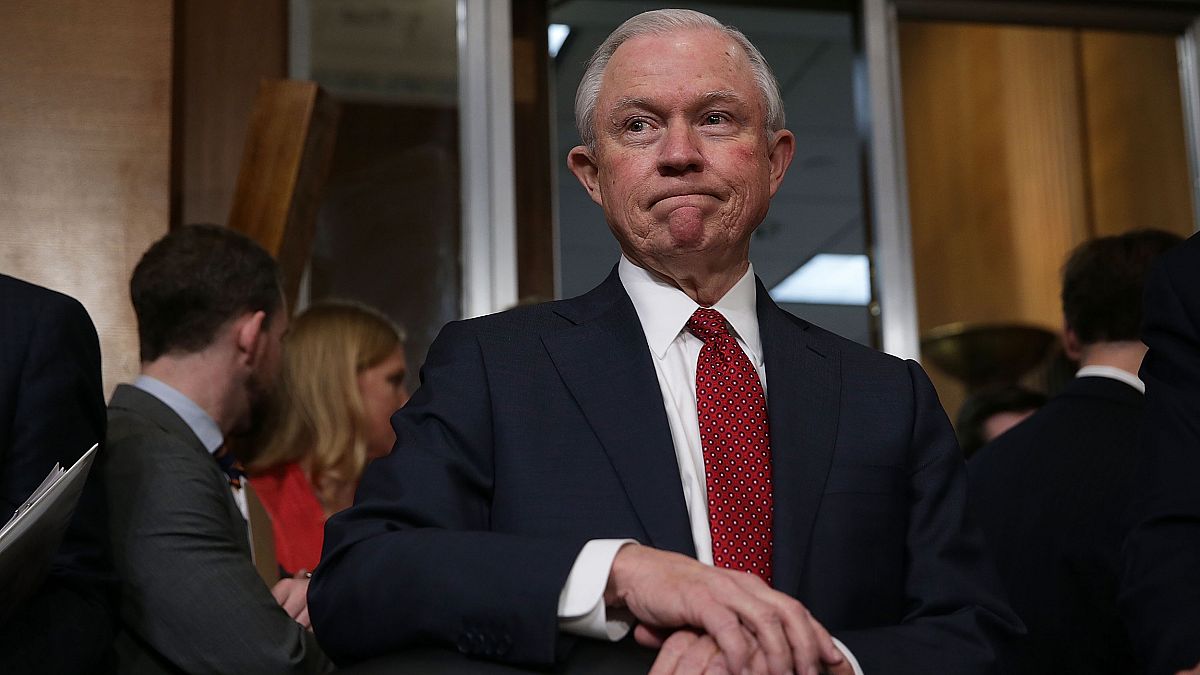Attorney General Jeff Sessions is taking so much friendly fire these days that it's easy to conclude he might soon be shown the Justice Department exit. But It may be that Sessions is untouchable. At the very least, veteran Washington insiders say, he's shown a survivor's instincts for dealing with Trump.
WASHINGTON — Attorney General Jeff Sessions is taking so much friendly fire these days that it's easy to conclude he might soon be shown the Justice Department exit.
President Donald Trump has long been apoplectic over Sessions' recusal from the Justice Department's Russia probe — as well as the agency's passing interest in allegations of misconduct by Trump's vanquished rival, Hillary Clinton — and the president often criticizes Sessions, the Justice Department and the FBI publicly.
"So General Flynn lies to the FBI and his life is destroyed, while Crooked Hillary Clinton, on that now famous FBI holiday 'interrogation' with no swearing in and no recording, lies many times ... and nothing happens to her? Rigged system, or just a double standard?" Trump wrote on Twitter last month.
Michael Flynn, a retired Army lieutenant general, was briefly Trump's national security adviser.
Three House Republicans — Chris Stewart of Utah, Jim Jordan of Ohio and Mark Meadows of North Carolina — called on Sessions to resign last week. In an op-ed in The Washington Examiner, Meadows and Jordan argued that leaks about the Russia investigation showed that the attorney general didn't have control over his department. And there have been reports that Scott Pruitt, head of the Environmental Protection Agency, is lining himself up to try to take Sessions' job.
Things have gotten so bad for Sessions that his chief defenders last week were the same Senate Democrats who railed against his appointment last year, a function of their fear that a new attorney general would be both more loyal to Trump and more able to affect special counsel Robert Mueller's Russia investigation.
It all adds up to the kind of drumbeat that usually portends the political demise of a Cabinet official.
But Saturday, Trump sought to quiet Sessions' critics. Asked whether he stands by his attorney general, Trump replied, "Yes, I do."
It may be that Sessions is untouchable. At the very least, veteran Washington insiders say, he's shown a survivor's instincts for dealing with Trump.
"Sessions has figured out a way to appease Trump at the moments where his ire is at its maximum," said Brian Fallon, a former spokesman for Justice Department during the presidency of Barack Obama and for Hillary Clinton's presidential campaign, who also worked on Capitol Hill. "Sessions finds ways to relieve some of the tension."
In the latest example, Trump's fury may have been tempered last week by reports that Sessions' Justice Department has been investigating the Clinton Foundation and is taking another look at Clinton's private email server. Trump had publicly pressured Sessions to investigate longtime top Clinton aide Huma Abedin over her handling of classified information.
Justice Department spokeswoman Sarah Isgur Flores said in an email that the possibility of Sessions' losing his job is a "non story" that has been "ginned up by the media."
But even if he's not fully pleased with Sessions, Trump may be stuck with him.
On a political level, it's not clear whether any possible replacement could win Senate confirmation at a time when two Republican defectors would be enough to scuttle a nomination.
And there's also the tricky legal question of whether firing Sessions could be interpreted as an attempt to obstruct justice in the Mueller probe, especially after The New York Times reportedthat a Sessions aide tried to dig up dirt on former FBI Director James Comey when he testified that his agency was examining possible Trump campaign ties to Russia.
While Sessions may be secure, his No. 2, Deputy Attorney General Rod Rosenstein, may not be if Trump continues to be displeased with the progress of Mueller's investigation. With Sessions recused, it's Rosenstein who oversees Mueller. If Trump decides he wants to fire Mueller, that order would go through Rosenstein, which could set up the kind of constitutional crisis that faced Justice Department executives during the 1973 Saturday Night Massacre.
Back then, President Richard Nixon wanted to fire special prosecutor Archibald Cox, who was investigating the Watergate scandal. The top two Justice Department officials resigned rather than carry out his order, and Cox was eventually fired by Solicitor General Robert Bork at Nixon's direction. Nixon won the battle, but the backlash from his heavy-handed tactics accelerated his defeat in the war to keep his job. The House began impeachment hearings less than two weeks later.
That history is reason enough for Trump to think twice about cashiering Sessions or any other senior Justice Department official.
